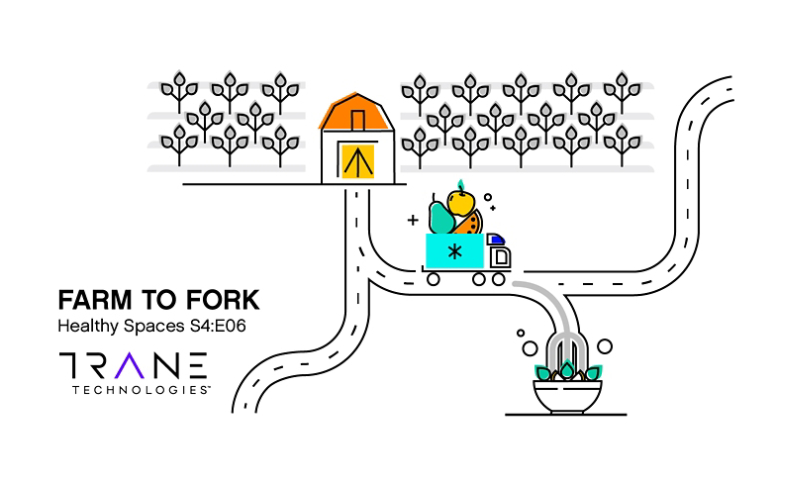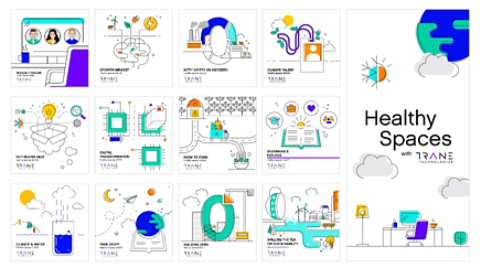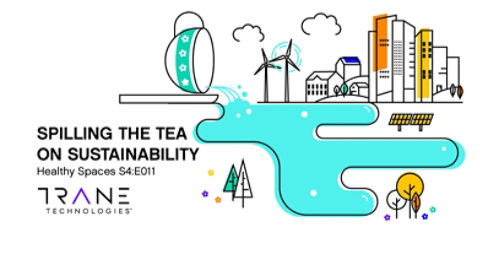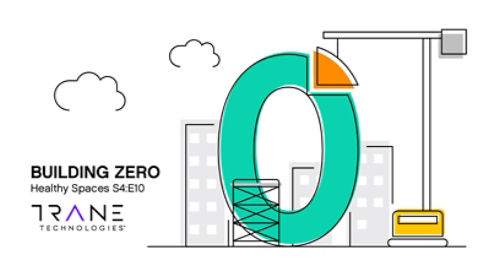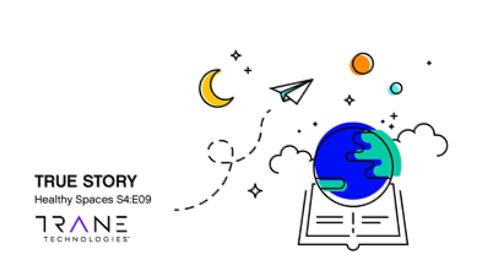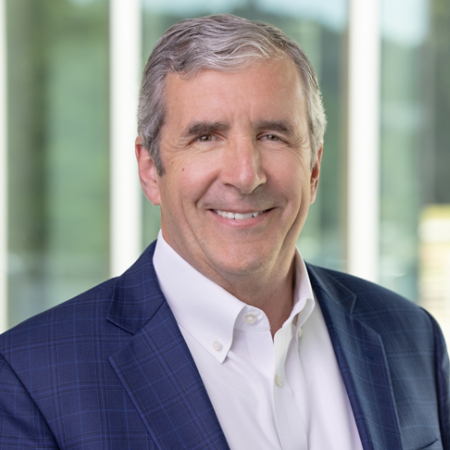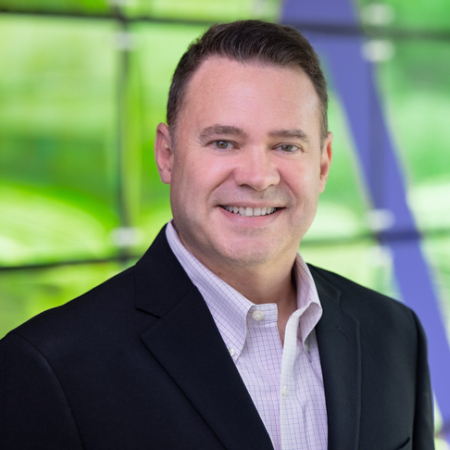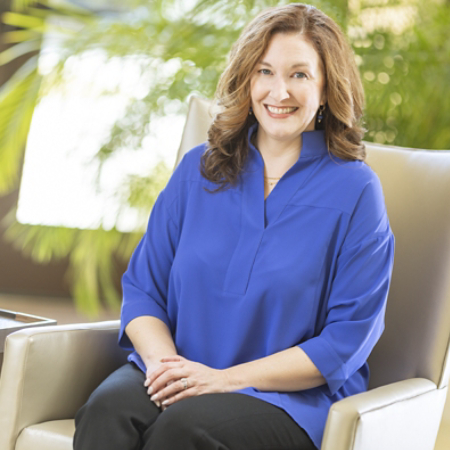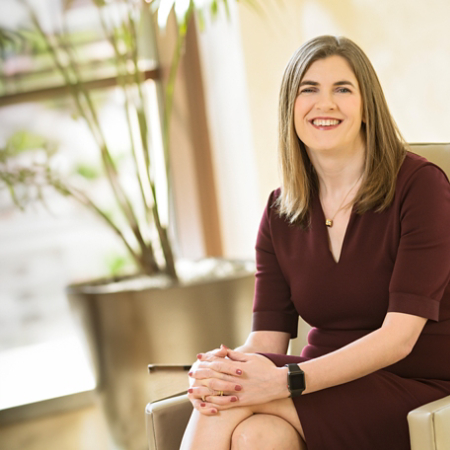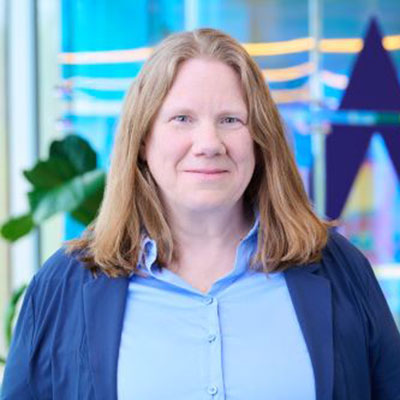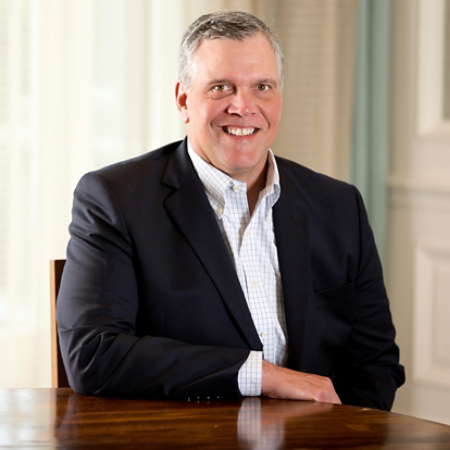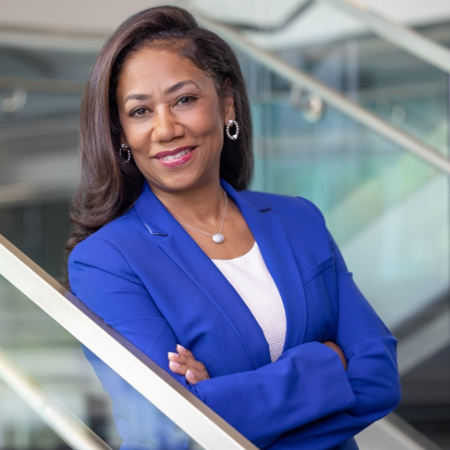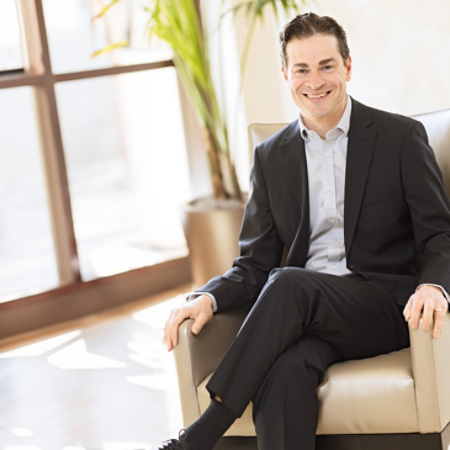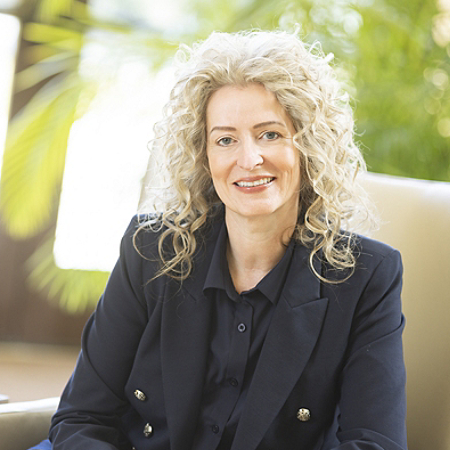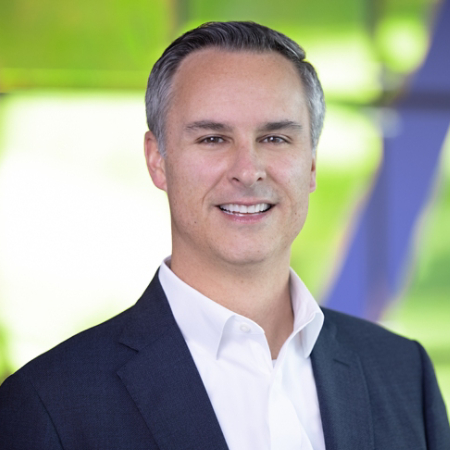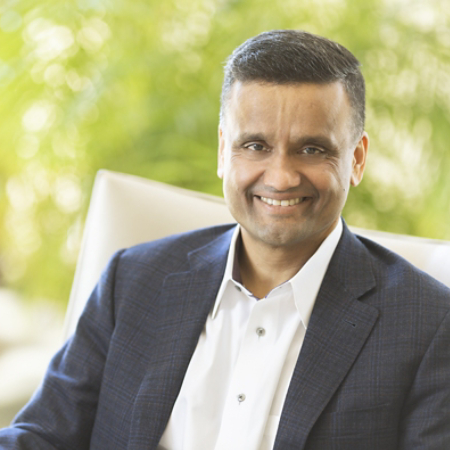AUDIO PROMPT - Music Fade In
[00:00:00] Dominique: When we think about our carbon footprint, we often think about reducing energy use and switching to renewable sources, but the food we eat has an impact on the environment too. In fact, 10% of global greenhouse gas emissions come from food loss and waste.
[00:00:20] Dominique: But thankfully, this challenge hasn't gone unnoticed by the businesses who are responsible for moving our food from farm to fork. In fact, it's leading to a new era of innovation in the cold chain sector.
[00:00:34] Claudio: Cold trade industry and the operators, the manufacturers like us, do a lot for bringing into the marketplace solutions that are making the cold chain more protected and working better and preserving the foods.
[00:00:50] Dominique: And this innovation isn't just making the food transport industry more effective at what it already does
[00:00:57] Renier: So, we decided to become self-sufficient and invest in renewable energy and look at energy, as a whole, on how we can become self-sustainable. And that's why we invested into solar, for the specific need to make sure we've got contingency.
[00:01:12] Dominique: You just heard from Claudio Zanframundo, President of Thermo King EMEA, and Renier Du Preez, CEO at Digistics.
[00:01:21] Dominique: I'm Dominique Silva, and you're listening to Healthy Spaces, the podcast exploring how technology and innovation are transforming the spaces where we live, learn, work, and play. In this episode, we will learn about the crucial role of innovative technologies in reducing food waste and enhancing the sustainability of supply chains.
[00:01:42] Dominique: We'll also explore how solutions like kinetic energy recovery systems are making significant strides in decarbonizing the long-haul transport sector, while also improving food security.
AUDIO PROMPT - Music Fade Out
[00:02:01] Dominique: First off, we hear from Claudio about why food loss is beyond just an environmental problem.
[00:02:07] Claudio: As of today, 10 percent of the global CO2 emissions are linked to food loss. It's something where we all have an ethical need to act for reducing, if you consider that, almost half of all the fruits and vegetables that are produced every year in a country, in a huge region like Europe, are wasted on an annual basis. 50 percent is huge, and it's an incredible amount of food that is wasted.
[00:02:37] Claudio: And 10 percent of the edible, the entire edible, food loss or waste is happening during the distribution phase. If you start piling up all those bits and pieces, that are even not bits and pieces, but are huge amounts of losses, you reach incredible quantities that are lost and wasted every year.
[00:02:59] Claudio: If we talk about our planet with more than 6 billion people, and you consider that one third of the global population is in a way or another suffering from food insecurity, there is a huge quantity of food that is wasted that could be channeled for helping people that, today, struggle to have a warm meal for their families. So, it's something beyond the business. It's something really ethical.
[00:03:26] Claudio: And it's something that, I think, in Thermo King and myself personally we feel strongly as a need, and an area where to act with the maximum urgency.
[00:03:37] Dominique: There's the human absurdity, let's call it, you know, so many people are going hungry, so many families are experiencing food insecurity, and yet we're wasting up to 30 percent of food that we're producing. I love that you brought in the economic aspect, because we talk a lot about that in the podcast, right? Around, you know, sustainability isn't just in a trend, it's a fashion, it's a new way of doing things. And so, there is value right for companies to adopt more sustainable practices. But Claudio, let's dig in deeper around this 10%. It sounds small, right? Just 10 percent of food losses during distribution, but it's humongous if you think about the thousands, if not millions of tons every year that go to waste. What is the role that you believe that the cold chain plays in minimizing or even eliminating these losses?
[00:04:32] Claudio: The cold trade industry and the operators, the manufacturers like us do a lot for bringing into the marketplace solutions that are making the cold chain more protected and working better and preserving the foods. Then, it's important that the operators, the logistic operators, are adopting the solutions. We have already in our product line up of products that can respond to the demand of how to make the cold chain more efficient, more sustainable because I talked about the food loss, but food loss is connected also with the emissions because if you are losing or you're wasting 50 percent of the fruits and vegetables well, you will have to transport twice. You will have to duplicate and multiply by two the CO2 emissions driven by the trucks, vans, trailers that are moving on the roads. So, what are the products that today can help? The first one is the axle power, and the axle power is a solution that we have developed with a German axle manufacturer, BPW, and we put our deep knowledge into electric and electronics. Axle power works as an energy recovery system fitting on a trailer. You have an axle that is recovering the kinetic energy of the vehicle when the vehicle is breaking, and that this energy is recharging a battery that we manufacture in Thermal King, and the battery is then powering the TRU unit that is refrigerating the box, the entire trailer. We have extensively tested this solution around all the EMEA region into very tough conditions from the South African or Central African routes up to the north of Europe, where the climate conditions during winter are particularly tough. We traveled now only with the test units more than a half a million kilometers. We have recovered through this energy recovery system more than 30 mega of energy. So incredible how this simple and smart way to use the energy can bring value.
AUDIO PROMPT - Music Fade In
[00:07:00] Dominique: 30 megawatts is a huge amount of energy to recover in such a short time, even for large trucks
[00:07:08] Dominique: But, what about smaller fleet vehicles? What's being done for trucks and vans, all which play a crucial last mile role in the supply chain?
AUDIO PROMPT - Music Fade Out
[00:07:19] Claudio: We are investing a lot for bringing innovations into the marketplace, especially in a moment, where a lot of our customers are moving toward electric vehicles. So, when you move toward an electric vehicle, you need to have also refrigerated unit that are perfectly adapting to the new needs of a BEV. And what are the main needs? Basically energy efficiency, so you need to have a unit that is saving energy as much as possible because typically the energy is taken from the battery of the vehicle. You need to be light, so you need to gain weight efficiency. You need, of course, to help the CO2 emissions during the entire life cycle of the unit. So, that's why we have developed the E-Series that is a new product line that is exactly fitting and is expressly designed for this kind of needs. It has an overall weight efficiency of 50% versus the previous generation of units. So, weight improvement means less weight to move so less energy consumed, and the more efficiency for the vehicle and for the shipment of the goods because consider that every kilo that is moved by a van, transporting goods, into a supermarket do have a certain value. But, on top of that the lower weight brings also a longer range, so we have a patented inverter technology with a variable speed hermetic compressor that we have expressly designed for that mission that is now launched into the market in a unit like the E-Series. 33 tons of CO2 during the life cycle of an LCV van. So, it's also from an emission point of view. It contributes consistently to reduce the overall emission of the single vehicle through a better efficiency, through a better payload, etc.
[00:09:21] Dominique: I think electrification is a big key word here, and it sounds like you believe this is the future to decarbonize the transport refrigeration industry. Anything else that you're excited about?
[00:09:43] Claudio: There is then one additional thing that I want to mention, that is helping into the cold chain efficiency, is the digital tracking. The digital tracking is something that probably is already part of our daily lives because we all have one or more devices that are tracked. Well, today the cold chain is able to provide full tracking of the products that are transported, and the goods that are transported, whatever is the transport mean. And the digital tracking that is preventing the spoilage of the food during the transport. First, as I say, reduce the risk to lose a cargo during the transport if there is something that is going wrong. A temperature that is apparently not going into the right direction, is not stable, is not in the range that is preset by a customer. You can immediately intervene. You can send a mobile workshop, close to the customer, and repairing and assisting and making sure that you guarantee the coaching continuity. So, data, and use of data, it's another huge way to improve our food loss risks that we have today.
[00:10:47] Dominique: This is a small side note here. There was one question, which I feel was already addressed, Claudio, but let me just say what the question would be and see if there's anything you want to repeat or emphasize. So, it's widely known that electrification of transport is the way to decarbonize this industry, but there are still barriers in the minds of those that need to invest in it, right? So, what do you think some of these barriers are and what is Thermo King doing to overcome them?
[00:11:16] Claudio: The first one is the range. That is what gives the sense of security to the customer. This is something that we are experiencing in our daily life. If you're running or using a fully electric vehicle. First of all, on this point, today, we already have solutions that are able to mitigate this sense of security regarding connected with the battery, and I mentioned that the axle power, that is a fantastic solution that today, can already provide the entire energy needed by a reefer just using the kinetic energy recovered by the vehicle that is waiting. The other point is the cost of the solution. In that sense, we are working very hard for making the payback of our solutions as short as possible, improving the TCO, the total cost of ownership of the customers.
[00:12:10] Claudio: Today the axle power that comes with a four years payback for a customer, that is for roughly 2,800 hours per year, over a life cycle of a seven year, that is a short life cycle in that sense because typically a trailer unit stays into the marketplace for 10 to 12 years. So, really today, we can have a very competitive payback, but we are not stopping here because we are working for making even more interesting the setting proposition shortening the payback period and improving the overall TCO, and it will be all a matter of progressive adoption because the more this solution will be adopted, the more customer will demand it, and the more the demand will increase, the better will be the payback for the customers. So, that’s the long-term goal, but already today we have really low hanging fruit that are making this solution extremely competitive.
[00:13:07] Dominique: That's a very positive message there, Claudio, and thank you for sharing that. So, at the time of this conversation we're leading up to COP29, and I heard Claudio that you won a lottery ticket, and you have been invited to speak at the world stage. So, for no more than 30 seconds, you will have all of the world leaders listening to you. What is that one thing you would tell them, Claudio?
[00:13:38] Claudio: Food loss is not the problem of someone else. It's our problem as individuals and to a planet, is an ethical commitment that we must have. Each of us, for leaving to our kids, to the next generation, a world that is simply better than the one we live in. And today, we have already the technology, we have already the products for mitigating food loss. So, it's all about adopting it. It's all about being open to embrace the changes and the technological changes. Each of us can be truly a contributor into that journey for fighting against the food loss.
AUDIO PROMPT - Music Fade In
[00:14:22] Dominique: Claudio makes a great point about how reducing food loss is a collective responsibility, and it isn't impossible especially with the technology we already have available.
[00:14:35] Dominique: But how can logistic companies implement new tech and strategies to enhance supply chain efficiency for their clients? To answer that, we turn now to Renier who's going to start us off by explaining what exactly his company, Digistics, does.
AUDIO PROMPT - Music Fade Out
[00:14:54] Renier: So Digistics is very close to logistics, so we enable our logistics strategies of our customers and that's our focus. And as CEO of Digistics, I think it's important that we need to make sure that we can enable our customers’ needs when it comes to the movement of product between the different locations, but also at the same time, how can we optimize that specifically in these economic times? Ultimately, what we do is we procure product that they would have selected from preferred suppliers. We would buy the product, store the product, we will process the orders, and then based on the orders that they've placed with us, we would then sell it off to their franchisees. We will then also collect the cash and pay the creditors for that. So, we ultimately run the end-to-end supply chain for them with regards to sourcing and fulfilling their supply chain needs.
[00:15:45] Dominique: And are you mostly focused on the food and beverage or the retail sector or what kind of industries do you mostly specialize in?
[00:15:53] Renier: So, Digistics specializes definitely in the food space with regards to the QSR market, but we're also doing some retail work where we could deliver product on behalf of a specific supplier. We would deliver to other retail, but we try to create a competitive advantage for our QSR customers by holding the primary product that goes into the QSR market because that optimizes the model, and it reduces the touch points within the supply chain. But in order to do that, they may also want us to then go to retail or other route to market, like moms and pops, but Digistics is part of a bigger business, part of super group, so we would try and then channel that through some of our smaller or our different companies that services the forecourt business or the hotel industry or any other industry within the food sector.
[00:16:41] Dominique: Interesting. Now, one thing that really differentiates Digistics from other companies is you've really, really made a commitment to sustainability. Talk us through what led you to make that choice. To make such a huge investment in sustainability and to really make that a part of a core of who you are.
[00:17:03] Renier: Operating in Africa, you know, electricity is a big challenge for us, so the reliance on government institutions to supply electricity is a major concern for us and for our clients. So, we decided to become self-sufficient and invest in renewable energy and look at energy, as a whole, on how we can become self-sustainable. And that's why we invested into solar, for the specific need to make sure we've got contingency because there's just not enough electricity going around. But at the same time, we're also investing in trucks that operate on batteries, which may sound strange because you need electricity for that, but the specific Thermo King technology allows us to not actually be on the grid. But it's then to create the contingency to address shortages of either fuel or electricity itself, but to also be sustainable as a corporate citizen. That's the responsible thing to do, but also from a contingency perspective and of course costs. We’ve managed to reduce costs on electricity, but we’ve also managed to reduce our transport costs. So, it all started off with sustainability, but when we started really looking at it, there's much more benefit.
[00:18:15] Dominique: So, you mentioned the Thermo King axle power system there earlier and some of the benefits that your customers are seeing in terms of reduced costs, but what other benefits did you see, right? Aside from the costs savings itself that allowed you to further adopt the technology.
[00:18:33] Renier: Just to put it into context we've got four vehicles, as part of our POC at the moment, and those vehicles are running for over a month now with no need to fill up any diesel on running our refrigeration or our tail lift. While that vehicle runs, it's quiet technology. When you do a delivery and you open up the back door, you don't have the fridge that is suddenly running because it needs to keep the load cold. It runs off the battery system. But that vehicle gets dispatched, where the battery level is sitting at about 35 percent and by the time it gets to its first destination, which on average for us on medium to long distance routes is about two hours, that battery is fully recharged. So even though we scarce from an electricity perspective and it's a risk for us, this vehicle we've never plugged in because there wasn't a need to plug it in. So, you save on the diesel side. It’s much better for the environment to start off with. And you get the cost saving on it, and you can operate at early hours in the morning within a residential area where currently with the diesel-powered vehicle, fridge, refrigeration, you can't do that. So that's some of the smaller added benefit that we got, which we didn't expect to get.
[00:19:47] Dominique: Excellent. And the whole push as well around electrification, you've talked about noise and self-sufficiency, but you just mentioned the urban areas, and I just realized what about air pollution as well, right? So, if we can minimize the amount of fossil fuels that were burning to keep these systems running there is a contribution to people's health. Now, I continue to be very intrigued, Renier, by Digistics, and I had to look to your website and there was one line that caught my eye. So, you say our customer's business is our business, therefore, we measure our success in how well we execute for them. This intrigued me because you're talking about being very results, metric driven, measuring success. And at the same time, you really pride yourselves on being a disruptor in your industry and disruption comes with having to take some risks. So how do you fit these two pieces together?
[00:20:45] Renier: I mean, if you think about it, we ultimately move boxes. We get an order, we process it, we pick it, we deliver it to a restaurant. It's very simple. If I look at it today, we go as far as bringing back our customers used cooking oil. We deliver to them in a form base, where they would use that to either make fries or chips, or even chicken, and then they create waste and then they had to pay somebody to do something with it, either make biodiesel out of it or rework it into something else. And we saw the opportunity where our client is contributing to emissions because you've got a bucky brigade that's driving around picking up this used cooking oil. And we said to them, well, why don't we provide you with a container that can bring back about a hundred liters on the same vehicle that would make the delivery? Initially, they thought we were crazy. But if you think about it, we ended up putting that empty dock below our truck. So, we're not taking up space where product is meant to go. When we get to that first delivery, we can then access the truck. We collect that used cooking oil that's in a fully loaded drum. We then buy the used cooking oil, creating value for them at that point. They would even then reduce further emissions by not contributing to what the bucky brigade would do. And then, they're benefiting off the fact that we take that used cooking oil back to the DC. We then transport that to a plant that can make biodiesel out of it, and then we mix that back into our fleet but by using the used cooking well as a blend into our tank. We then use a factor of about 0.7 versus an emission factor of 2.9. So, our reduction is more than threefold when it comes to emissions. And the last project we're working on now for them is actually food waste because they still got an element of food waste, but you can't bring it back on the same vehicle delivering product. So, we're going to most probably partner with a waste company to see how we can then also bring back the cardboard boxes plus the food waste and this is how we try and find value. It's not so much them being reliant on us, but it's about us solving their needs, and that builds great partnerships in the long run.
AUDIO PROMPT - Music Fade In
[00:23:01] Dominique: Digistics integrative and holistic approach allows them to solve real operational problems for their clients while improving supply chain efficiency and reducing their carbon footprint. It's a win, win, win for everyone.
[00:23:18] Dominique: So with innovation being so core to what they do, I asked what's in store for the future of Digistics.
AUDIO PROMPT - Music Fade Out
[00:23:27] Renier: I think renewable technology is starting out. I think there's so much opportunity still that's coming. I think battery technology can definitely improve. It can get lighter, can store more. Listening to what's happening around the world, it sounds like that's in our new future. Gas is an opportunity for us for sure. Our only concern is the constant supply of it. I think the future is going to still have to be very creative. At night, how do you charge a battery if there's no sun? The one thing we're considering is using a very small fan technology, where you could charge at night as long as there's a little bit of wind and that's something we can plug on top of our current solar solution. All our coastal DCs have got solar technology implemented, and it's about 20 percent of our energy need that we now get off renewable energy. And I think that's something we would want to keep on growing to see how high we can get it. Can we get it to 50%? Can we get it to 80%? And if I think of supply chain people looking at near sourcing and onshoring, and there's just so much happening in the space and adding sustainability capability to that and what's happening there, I think it's the best time to be involved in this as a technology. We believe that it's putting a lot of industries on the pressure to think out of the box. And we're doing quite a lot of work with our forecourt type businesses, where a lot of them are heavily invested into that diesel space. And they are also now looking at selling us renewable technology. So, Total as an example, they're now known as Total Energies, and we're partnering with them to find creative ways on how do we generate energy? And I'm very excited on the Thermo King capability of the tri axle. We are definitely going to invest in more of those vehicles for the simple reason that it actually delivers what it's meant to deliver and being a country that doesn't have a lot of access to electricity while it generates its own electricity, and I don't even need to have it grid tied. I mean, well, that's a no brainer.
[00:25:32] Dominique: Well, for my final question, you are also a leading voice at the Global Cold Chain Alliance. So, can you tell us a little bit more about what are the big conversations happening around the cold chain industry? What are the biggest concerns or even opportunities that the industry sees on our sustainability path?
[00:25:50] Renier: I think food waste is our biggest challenge, specifically in Africa. I think food waste is so big that it's time that we need to acknowledge that there's a risk. I mean, there's people that are starving, there’s nations that are going under. And I think it's because they just don't have that culture and infrastructure. We’ve determined as much as 30 percent of food gets wasted just because there is no cold chain infrastructure. And I think the opportunity in Africa is to find ways to create small, refrigeration holding ability or capability in certain countries that can be self-sustainable to avoid the fact that you don't have to waste all that food. I think where the opportunity really sits is part of looking at the community and adding value is how do we create a smaller, refrigerated, almost off grid solution for some of those communities, and I think that's something we're going to definitely want to work with the GCCA on and play a role in that as a player within the industry, and I think we're also trying to get government support on it because there's a lot of collaboration on the free trade agreement across Africa. I don't think we're going to have free trade, to be brutally honest, ever because a lot of these countries are reliant on those duties. But I do think as business, we can add value in the space to address the food shortages because these children, families, women suffering just because of the fact that we're not finding creative ways to deal with food waste. And I think that's going to be our biggest opportunity in Africa.
AUDIO PROMPT - Music Fade In
[00:27:27] Dominique: A big thank you to Claudio and Renier for joining us on today's episode, where we discuss the critical role of innovative technologies in reducing food loss and enhancing supply chain sustainability. At Trane Technologies, we believe that every job is a sustainability job, and every role provides an opportunity for impact.
[00:27:49] Dominique: That's why each week on the podcast, we'll feature how someone is building healthy spaces in their organization or community.
[00:27:57] Dominique: This week, we're sharing a submission from Kelcie Carew, Service Project Administrator in Calgary, Canada.
[00:28:04] Dominique: Kelcie is building healthy spaces by getting actively involved in local projects that support her community. In April, she teamed up with Tim Hortons for their Smile Cookie campaign where she enjoyed decorating cookies at a local Tim Hortons. All cookie sales went to various charities, including the Calgary Drop-in and Rehab Center. This made the whole experience super rewarding for her and a great reminder of the joy in helping others.
[00:28:32] Dominique: Kelcie, thank you for sharing your initiatives. And thank you for all the hard work you and your team are putting in. Would you like to share how you're building healthy spaces too? Well, to share your story, you can visit us at tranetechnologies.com/healthyspacespodcast. Thank you for listening in to the Healthy Spaces podcast, where we explore how climate technology and innovation are transforming the spaces where we live, work, learn, and play.
[00:29:01] Dominique: If you want to find out more about our conversation today, make sure you check out the show notes and remember to rate and review us in your favorite podcast app. That's it for today's episode. We'll see you next time.
AUDIO PROMPT - Music Fade Out
